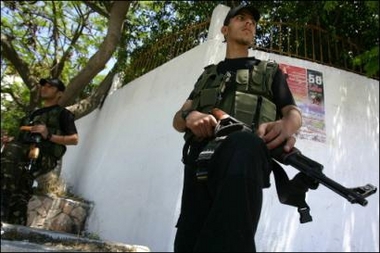The Hamas-led Palestinian government ordered its militia off Gaza's streets
on Friday in the wake of clashes with President Mahmoud Abbas's rival Fatah
movement that stirred fears of civil war.

A Hamas-controlled
security force, pictured patrolling in Gaza City, which has been accused
of pushing Palestinian factions to the brink of civil war, withdrew from
the streets of the Gaza Strip 26 May, said a commander of the paramilitary
force. [AFP\File] |
The move comes a day after Abbas stunned Hamas with an ultimatum to back a
proposal for Palestinian statehood that implicitly recognises Israel or face a
referendum on the issue.
Abbas gave the government 10 days to back the proposal, effectively going
over the heads of the Islamist militants and setting the stage for a showdown.
Hamas seeks to destroy Israel and has rejected Abbas's calls for talks with the
Jewish state.
Youssef al-Zahar, a leader of the 3,000-strong Hamas force in the
impoverished Gaza Strip, told Reuters the interior minister had ordered the
pullback.
"We have received orders to withdraw from the streets and to concentrate in
certain locations to be ready to rush to the scene when needed to confront
chaos," Zahar said.
Government officials and a Hamas spokesman confirmed the order, saying it was
partly to reduce tensions with Fatah.
No members of the force were visible in the streets of the impoverished Gaza
Strip early on Friday, Reuters witnesses said.
Clashes between Hamas and Fatah have become more frequent since the unit was
deployed last week. Government officials have said the new force would not be
disbanded, despite calls from Abbas to do so, but integrated into regular police
units.
Abbas and Hamas have been engaged in an increasingly bitter power struggle
since the Islamists took office two months ago after beating Fatah in January
elections.
Raising the stakes, Abbas on Thursday gave Hamas 10 days to back a plan for a
Palestinian state alongside Israel or face what would amount to a confidence
vote.
Passage of the referendum might offer Hamas an opportunity to moderate its
opposition to Israel and any peace negotiations without having to formally
change its stance.
Addressing the first of two days of national dialogue aimed at easing
tensions, Abbas said on Thursday that if an agreement was not reached, a
referendum would be held in 40 days.
The proposal calls for a peace settlement if Israel withdraws from all of the
West Bank and Arab East Jerusalem, occupied since the 1967 Middle East war.
The plan was drawn up in an Israeli jail by senior prisoners from factions
including Hamas and Fatah.
Israel has not commented but has long rejected pulling back from all the West
Bank. It has said it intends to keep large Jewish settlement blocs there and
also considers Jerusalem its "eternal and undivided capital".
Palestinian factions involved in the final day of national dialogue on Friday
were expected to debate Abbas's ultimatum.
Hamas leaders have been taken off guard by the normally cautious Abbas. Some
have slammed the ultimatum while others said Hamas had nothing to fear from a
referendum.
"The government took office only two months ago, so why hold a referendum?"
one senior Hamas official said on Friday. "The aim is to make us fail, but we
won't."
At the heart of the internal conflict is the refusal of Hamas to accept
demands from Abbas and the West to recognise Israel. That stance has triggered
an aid boycott that has brought the Palestinian Authority to its knees.
The prisoners' proposal calls for an independent Palestinian state in the
West Bank and Gaza, with Jerusalem as its capital. It also seeks a unity
government